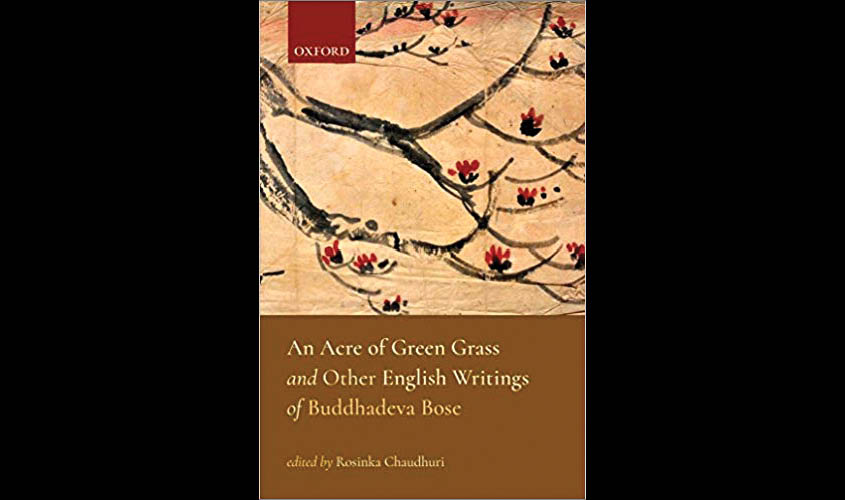Bengali poet and novelist Buddhadeva Bose wrote a series of dazzling essays in English, on subjects ranging from art and literature to cinema and food. Vineet Gill writes about Bose’s English prose.
Who is a bilingual writer? Someone who keeps the pencil sharpened at both ends, as the poet Arun Kolatkar used to say. In other words, someone who writes, publishes and thinks in two languages rather than one. Few examples spring to mind. Samuel Beckett’s crossing-over from English to French in search of difference and vitality. Vladimir Nabokov’s cultural exile from his beloved Russian to English. To this rather diminutive list, I would add Kolatkar’s name, for the constant back-and-forth between English and Marathi in his body of work. And the names of the canonical greats from Bengal: Madhusudan Dutt, Bankim, Tagore. That their canon-defying literary successor, Buddhadeva Bose, also wrote a series of dazzling essays in English—besides the vast collection of poems, novels and stories in Bengali—I discovered only recently.
An Acre of Green Grass and Other English Writings of Buddhadeva Bose, published earlier this year by the Oxford University Press, includes over a dozen nonfiction pieces—ranging from pamphlet-length literary surveys to compact newspaper reviews—that Bose wrote for his Anglophone readership 1940s onwards. He wrote in English despite all his reservations about the imperial language. The creative imagination owes a duty to the mother tongue, Bose held fast to this view as a colonial writer. He wanted, in his own words, “freedom from the cultural domination of English”. Yet he never repudiated his bonds with the language, never ceased to regard it with the kind of seriousness that writers reserve for the things they love.
Much of An Acre… is about love: of language, literature and life. There’s no other unifying theme holding the book together, except that of a writer exploring his interests. In Bose’s case, these interests formed a delightfully random pattern—crisscrossing through modern art, Romantic poetry, Bengali cuisine, American cinema, Russian literature and more. Ever the true cosmopolitan, Bose felt a sense of belonging in every culture he engaged with. And so, only he could see in the American novelist Henry Miller, glimpses of “certain middle-aged Bengali authors whose work had brought them fame but very little money”.
In the same spirit, when writing about his own tradition in English, Bose isn’t addressing an outsider. Amit Chaudhuri, in his preface to An Acre…, draws attention to how Tagore assumed the role of an “Indian” in his English writings, an “explainer” of India’s cultural and political realities. In contrast, Chaudhuri says, Bose “was not an explainer in English”.
Nevertheless, he was an excellent literary guide. Bose’s appraisal of modern Bengali literature, first published in book form under the title An Acre of Green Grass in 1948, and reproduced here in its entirety, calls to mind the sagacity of V.S. Pritchett and the swagger of Edmund Wilson. In these pages Bose is handing down judgments, separating the great from the merely good, tracing lineages and questioning reputations. Pramatha Chaudhuri, Bose tells us, was the only one among “Rabindranath’s juniors who influenced the poet without being influenced by him”. The prolific and popular Saratchandra Chattopadhyay was the “first professional writer” in India. Nazrul Islam’s output suffered from a “thinness of thought-substance”. Subhas Mukhopadhyay “quite succeeded in asphyxiating the poet in him with the gas of political propaganda”.
These figures were Bose’s contemporaries or near-contemporaries. This is worth highlighting, as the OUP volume’s editor, Rosinka Chaudhuri, does in her introductory essay. The critical mission Bose had set himself was a difficult one. Not to sing of a golden past—as Pritchett and Wilson often did—but to chart the contours of a living tradition.
Tagore’s centrality to that tradition is undeniable. Indeed, the venerable Rabindranath is a constant presence in these pages, the lodestar and point of reference Bose used for assessing other talents and making his own aesthetic choices, whether pro- or contra-Tagore. “Recently, in Bengal,” Bose writes, “a magazine which claims to be avant-garde roundly deplored my ‘blind devotion’ to Tagore. Others, finding me lacking in reverence for the great man, attacked me with exemplary gusto… I have been hauled up as an idolater or iconoclast, or both at once.”
It’s an old literary-critical plot line: the apprentice declares that he wants to take a “balanced” view of the mentor’s work, thus setting the scene, before letting fly and giving free rein to every patricidal impulse. By contrast, Bose’s writings on Tagore are remarkable for their generosity. They can be seen as a tribute from one writer to another—a rare gift in a literary culture that celebrates “hatchet jobs” and “takedowns”. Some of the most moving passages in this book are to be found in the essay entitled “The Last Days of Rabindranath”. It is an account of Bose’s valedictory visit to Santiniketan, where the great poet lay dying. (Shambhu Shaha’s beautiful photographs of Tagore in his final years, reprinted here, add to this chapter’s poignancy.) Confined to his sick bed, the travel-hungry Tagore, Bose writes, “created variety for himself in that single room”. “The arrangement of the furniture of the room was altered every day, his easy-chair faced different directions…”
Talent isn’t enough. You need something more—a keen eye, a big heart—to be able to sense the pathos in a vacant chair. Whether it is Charlie Chaplin he’s writing about, or Picasso or Baudelaire, Bose is extraordinarily sensitive towards his subject, so that sometimes even the blemishes are embraced as part of the package. (“A Tagore freed from his faults would not be Tagore at all…”; Boris Pasternak’s Doctor Zhivago “has all the faults and glories of a novel written by a poet”.) The phrase he used in relation to Ezra Pound, “a world-faring mind”, applies to Bose as well. An Acre… gives us a fair portrait of that mind. But it leaves us hankering for more, urging us on to step across the divide—from English to Bengali.

